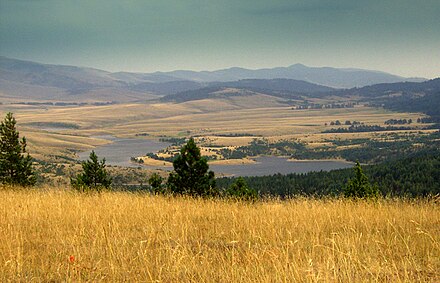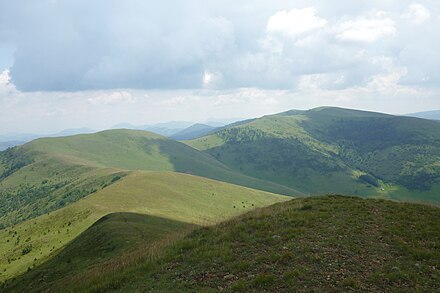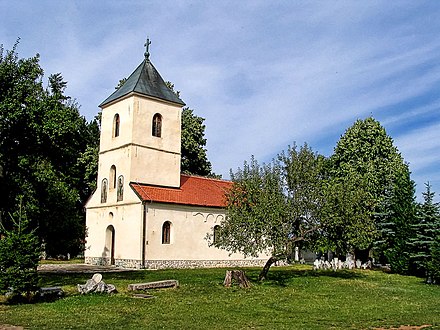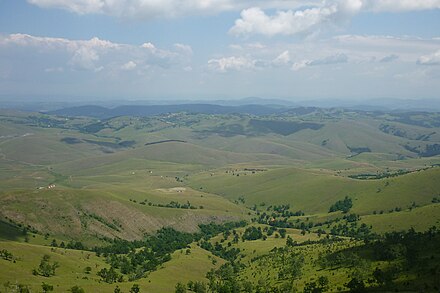Zlatibor - mountain region situated in the western part of Serbia
Zlatibor (meaning "Golden Pine") is a very popular mountain resort area in south-western Serbia. It is bounded on the north by Mount Tara, to the east by the Veliki Rzav River, to the south by the Uvac River and to the west by Bosnia and Herzegovina.
Towns and villages

- Zlatibor town — modern town with a lot of good places to go out and spend some great time, it's Zlatibor's centre, and has some historical monuments
- Cajetina — administrative centre of Zlatibor, it has some historical monuments
- Dobroselica — a village with a wonderful nature and one old small wooden church
- Gostilje — a tourist village with a wonderful big waterfall. Near by there is also a big and beautiful cave, called Stopica pecina (Eng. The cave of the Stopic family)
- Mackat — village famous by meat products, such as very popular Zlatiborian prsuta (sort of very delicious dry meat).
- Mokra Gora — famous village tourist site with an old railway. There is so-called the Sargan Eight (Sarganska osmica), the old railway that looks like the number eight, which was built in that way so the train could get up on the Sargan hill. Wooden town Drvenigrad (Kustendorf), built by Emir Kusturica for one of his movies, located close by.
- Sirogojno — village famous for open-air museum Staro selo (The Old Village Museum), where old houses collected from all over Zlatibor
Understand

Climate
Warm and pleasant summers and not so cold winters. Zlatibor's air is very clean and healthy and going to Zlatibor is recommended for those who have tyroide gland-related and breathing issues.
Relief
Medium hills and a lot of fields. Highest peak is Tornik at 1496 meters (4908 feet), and other peaks are Brijac, Cigota, Vijogor, Konjoder, Liska, Gruda... Branesko polje (the Branesci Plain) is the biggest Zlatibor's plain.
Hydrography
Zlatibor has a lot of very pure and clean water. There are many smaller and bigger rivers, but there are no natural lakes. There are only a couple of artificial lakes. Zlatibor's waters have good infuence on human health because they contain some minerals.
Plant and animal life
Many animals inhabit Zlatibor's woods and pastures. More than 120 plant species can be found in Zlatibor's fields.
History
The first inhabitants of Zlatibor were the Illyrians. They left their small tombs all over Zlatibor. Romans conquered Zlatibor in 4th century BC and the Illyrians were romanized.
Slavs came in 7th century from what is today Poland.
From 1463 to 1804, Zlatibor was a part of the Ottoman Empire.
Beginning of tourism in Zlatibor dates from August 1893, when Aleksandar I Obrenović, king of Serbia, came to Kulaševac, as Kraljeve Vode were called back then. However, the real tourism started in 1905, when the king Petar I Karađorđević visited Kraljeve Vode.
People
The Zlatiborians (Zlat. Zlatiborci) are famous by their smartness and literacy. They are very friendly and hospitable people. They like to make jokes and trick somebody, especially the tourists, but never because they want to hurt them, but merely for the fun. They like to help others.
Talk
In formal situations, Zlatiborians use the literary Serbian language. In unformal situations, however, languages that are used are the Traditional Zlatiborian, and the Neo-Zlatiborian.
The Traditional Zlatiborian is a dialect of the Serbian language. It is quite similar to the standard Serbian, but there are many differences. Knowing standard Serbian could be useful if you speak with a Zlatiborian villager, but not always. The Neo-Zlatiborian is a mixture of the Traditional Zlatiborian and the literary Serbian language.
English is not spoken in Zlatibor's rural areas, but in urban areas (in Zlatibor town and Cajetina) many people just know some words of it, or speak it well. However, entering a hotel or a restaurant where English isn't spoken could be quite possible.
Get in
When you come to Zlatibor, you will probably come to Zlatibor town, which is a small but very modern town (much more than the administrative centre of Zlatibor - Cajetina). It is connected with other Zlatibor's towns and villages. When speaking about Zlatibor, many people usually refer to Zlatibor town only.
The best way to get to Zlatibor is to get to Belgrade, the capital of Serbia, and then to look for a direct bus line to Zlatibor. Bus lines connect Zlatibor with all parts of Serbia, and Montenegro.
You can also come to Zlatibor by train from Belgrade and other bigger cities, but you'll end up in Semegnjevo, Susica, Sljivovica, or Jablanica, Zlatibor's villages. The main train station for Zlatibor, despite being called the Zlatibor Train Station (Zeleznicka stanica Zlatibor) is in the village of Semegnjevo, 10 km away from Zlatibor town. Coming to Zlatibor town from there could be difficult, because there aren't a lot of people who speak English, so it would be better to leave the train in the neighboring city of Uzice, and then use a bus to come to Zlatibor. There is more than 15 local buses from Užice to Zlatibor town (45 minutes).
Get around


 There are local buses going from Uzice to Zlatibor town, passing Cajetina and Mackat villages on the way.
There are local buses going from Uzice to Zlatibor town, passing Cajetina and Mackat villages on the way.
There is one main taxi operator Taxi Alex (dead link: December 2020), tel. +381 31 846 100, with prices similar to Belgrade - flag down fee 170 RSD, every kilometre 100 RSD. For distant journeys it's far cheaper (twice) to request taxi from Uzice.
See
Staying in Zlatibor town is recommended, but don't miss to go and see the Zlatibor's nature and attractions of the Zlatibor's villages. Use one-day tours or picnics to Mokra Gora, Sirogojno, Gostilje and other villages to do that. Many tourist agencies provide such tours.
Zlatibor town
- Fountain of King Alexander I (Kraljeva cesma), Zlatibor town, 43.72565°, 19.70080°.
Northern Zlatibor
Its centres are Kremna, a village where the famous prophets from the Tarabic family lived, and Mokra Gora, a famous village tourist site with an old railway.
- Šargan-Eight narrow-gauge railway (Sarganska osmica), Mokra Gora, 43.7925°, 19.5071°. The old railway that looks like the number eight, which was built in that way so the train could get up on the Sargan hill.
- Drvenigrad, Mokra Gora, 43.7957°, 19.5085°. 2018-09-08
- The Home of Prophets (Dom proroka), Kremna village, 43.8389°, 19.575°. House where the famous prophets from the Tarabic faimly lived.
Eastern Zlatibor
Apart from Sirogojno open-air museum, at the northern part of this region there is Mackat, a village famous by meat products, such as very popular Zlatiborian prsuta (sort of very delicious dry meat).
- Open air Old Village Museum (Staro selo), Sirogojno, 43.68893°, 19.88001°.
- Waterfall Gostilje, Gostilje village, 43.6565°, 19.8380°.
- The Stopics' cave (Stopica pecina), near Gostilje and Sirogojno, 43.70227°, 19.85512°.
Southern Zlatibor
Southern part of Zlatibor, Murtenica, is known as a hiding place for Zlatiborian ajduci, a sort of special forces who fought the conquering Turkish army. There is one of the three Zlatibor's old wooden small churches - in the village of Kucani.
- Old Wooden Church (Crkve brvnare), Kucani village, 43.5453°, 19.8519°.
Western Zlatibor
Two of three Zlatibor's old wooden small churches can be found here - in the villages of Jablanica and Dobroselica.
- Tornik, 43.6555276°, 19.6043557°. The highest peak of Zlatibor with a ski centre. 2018-09-09
- Old Wooden Church (Crkve brvnare), Jablanica village, 43.65208°, 19.58336°.
- Црква светог пророка Илије (Crkve brvnare), Dobroselica village, 43.61612°, 19.70451°. Old Wooden Church built in 1821.
- Uvac Monastery, 43.61223°, 19.58838°. Built in 12th or 13th century in the Raška architectural school. 2018-09-09
Do
- Skiing in Zlatibor town or at Tornik, if you come to Zlatibor by winter.
- Ski lift in Zlatibor town, 43.7227°, 19.6910°. 2018-09-08
- Ski lifts near Tornik, 43.6645°, 19.6435°. 2018-09-08
- Hiking Zlatibor's hills, such as Sumatno brdo (smaller hiking) and Cigota (a great hiking for professionals), if you come to Zlatibor by summer.
Eat
- Zlatiborian prsuta, a sort of dry meat which is very delicious.
- Zlatiborian cheese (Zlat. kackavalj or sir), very delicious sort of cheese.
Drink
- Slivovitz (Zlat. sljivovica), a sort of plum brandy
Sleep
There are many nice hotels in Zlatibor. Some of the biggest are Palisad Hotel, Olimp Hotel, Suncani breg Hotel, Kraljevi konaci apartments, Stacionar Hotel (also called Cigota and The Institute, and by half is a medical institution).
Many Zlatiborians have private rooms and apartments of big quality in their own houses. There are also some private apartment buildings. Note: apartment in Zlatiborian does not mean a place to live as in English, but a better-quality room for guests and tourists. While the common rooms have nothing but beds (maybe some rooms of a better quality have a TV set), the apartments have a kitchen, a TV, a couch, and some luxury ones even a computer.
Stay healthy
There is a big medical institute in Zlatibor town (also called Stacionar or Cigota and is by half a hotel) and a small ambulance. In Cajetina there is a public medical institution called Dom zdravlja. The nearest hospital is in the neighbouring city of Uzice.
Go next
- Tara National Park
- Višegrad (Bosnia and Herzegovina)
- Uzice
Related Wikipedia article: Zlatibor
Zlatibor
Date Time:Please wait...Timezone:Europe/BelgradeCoordinates:43.65, 19.68
